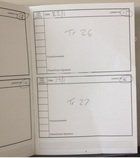Get The Best From Your Teacher

This is a very important section.
Your child may be having lessons at school. In which case there may be little or no contact between you and the teacher.
Your child may have private lessons. If they are at home you will have the chance to get a rundown of each lesson. If they are at the teacher's house then it's less likely that you can speak with the teacher each week.
I teach in 4 schools currently and have very little contact with the parents of the children I teach, though I do have most of the parents' email addresses and I do try to email them if a child does particularly well or if a child isn't making the progress I would usually expect.
My private pupils however are different. Most parents drop off and collect their children so I try to give a short rundown on the lesson and what I'm expecting from the coming weeks practice.
I strongly suggest that a practice note book be used in every lesson. The teacher writes in the book what is required from your child during the coming weeks practice.
You can check what your child is supposed to be practising and add your own comments as necessary each week for the teacher to read.
I'm always particularly pleased when the pupil adds his/her comments. It tells me he/she has read my notes, understood them and tried to complete everything.
Even a simple tick beside each requested practice item shows that the child has made an effort.
Also, why not suggest sitting in on a lesson or two. It will keep you in touch with what your child is working on and help you to work with your child during the week.
You have enough knowledge now from my previous emails to understand what goes on in a music lesson and discuss your child's progress with the teacher in an informed way.
Music lessons don't come cheap. Get the most from the violin teacher and establish a good line of communication. Ask for his/her email address and get an update occasionally.
This is particularly important during the lead up to music exams. My Top Tips on what you need to know about music exams and how to prepare for them are available on this site.
Things to look out for:
- Does your child enjoy violin lessons?
- Does your child have a good understanding of the weeks practice requirements?
- Does your child ever do any duets with the teacher? (Pupil and teacher playing a piece written for 2 violins)
- Have you been given a clear idea of when your child is taking the next examination?
- Does your child have any understanding of the music theory elements?
- Does the teacher give you regular feedback?

Rather naughty...I was teaching at a school a few weeks ago and found a practice book left by a pupil.
I must add that this pupil is NOT one of mine - he plays the guitar, but I decided to take a peak and look at his practice notes.
I couldn't believe my eyes when I saw that every page looked liked this!! Shock horror! I just had to take a photo of it as I knew I might include it as an example to show you of just how a practice book SHOULDN'T look.
If your child's practice book looks anywhere near as bear as this - you need to act NOW.
Do you already have regular communication with your child's violin teacher? If so does your child have weekly practice requests and guidance notes each week from his/her teacher?
I can't begin to tell you how important a weekly practice notebook is. If your child is very young then you will of course have to read the notes from the teacher to your child.
However ideally your child will open the notebook first before turning to any music and read what the teacher has written.
I always try to write very neatly and use simple words so that my young pupils and read and understand what I'm writing. I use images where possible to make it visually easy to grasp.
Again, I must emphasis that we are working towards your child being able to practice productively without too much help from you. This is the whole point of my Violin Practice Rescue Program
If you don't have regular contact then I suggest you ask for the teacher's email address or phone number and introduce yourself and ask for a progress update. Do this on a regular basis and work with the teacher to help your child move forward.
Is it possible for you to sit in on a lesson or two? If so, do suggest it and get yourself more in touch with your child's violin learning experience.
Don't be afraid to write notes to the teacher in the notebook about how the weeks practice has gone. I'm always grateful for some parent input.
Many children are left to their own devices when it comes to violin practice so when I'm aware that a parent is helping in what ever way they can I'm very pleased. I'm sure your teacher will feel the same.
Are you still using the weekly practice schedule? I gave you a template for this in the 'Getting Started' section. If so why not suggest your child take it to the next lesson to show the teacher?
I hope you have some success with these suggestions.

- Establish contact with your child's teacher if you haven't already
- If you aren't able to attend any lessons then keep in touch via email/text/phone
- Ask for regular updates on your child's progress
- Ask to arrange to sit in on a lesson every few weeks if you possibly can
- Make sure your teacher writes the weeks practice requests and tips in a practice note book. Depending on your child's age - either you or your child can comment on the weeks practice efforts
- Always read the practice book first before playing anything in a practice session. Use practice time wisely and don't waste it on practising things which weren't asked for by the teacher
Letters After Their Name

If your child's teacher has attended one of the Music Colleges in London then he/she will have a string of letters after their surname.
These can be baffling so here's what they mean:
ALCM Associate of the London College of Music
ATCL Associate of the London College of Music
ARCM Associate of Trinity College London
ADMT Associate Diploma in Music Teaching
Dip ABRSM Diploma Associated Board of the Royal Schools of Music
Then there are Licentiate qualifications, which are an extension to the Associate qualifications:
LRSM Licentiate of the Royal Schools of Music
LLCM Licentiate of the London College of Music
LTCL Licentiate of Trinity College London
LRAM Licentiate of the Royal Academy of Music
LRCM Licentiate of the Royal College of Music
LGSM Licentiate of the Guildhall School of Music
A Fellowship follows the Licentiate qualification, for example FTCL is a Fellow of Trinity College of Music London. You may come across other qualifications such as a Diploma in Music, which is usually abbreviated to Dip.Mus, or a Graduate Diploma, abbreviated as Grad.Dip.Mus.
The Bachelor of Music is abbreviated as B.Mus.
Of course having letters after a name doesn't necessarily mean he/she is a good teacher. However, it does show that they have been through some rigorous formal training and you would be safe to assume that they have reached a high level on their given instrument along with gaining a vast knowledge of music as a whole.
Now all you have to do is find out if they are any good at imparting that knowledge to others!
If you are looking for a new teacher I recommend that you ask for a trial lesson or two. This will give you and your child the opportunity to meet the teacher without getting tied into any long-term commitment.
Try to establish their teaching style to see if it will suit your child.
For example, does the teacher simply push forward with exam after exam or do they include other music and new skills between exams?
What are their weekly practice expectations? Will your child be able to meet those expectations?
Is the teacher a performer? Will he/she be away alot? Will they be able to make up lessons?
Do they teach during school holidays as well as term time?
Will the teacher also cover some basic music theory? Do avoid the quick 10mins theory tacked onto the end of a lesson. This isn't long enough to learn anything new or explain anything fully.

- Check out your teacher's qualifications
- If you are looking for a new teacher - ask for a trial lesson or two
- Establish if the teaching methods will suit your child
- Your child should look forward to lessons. Not dread them!
- Work out a plan that will cover some music theory learning